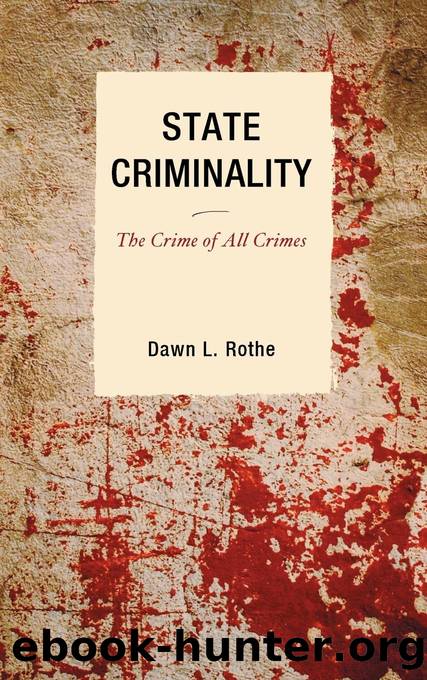State Criminality by Rothe Dawn L.;

Author:Rothe, Dawn L.;
Language: eng
Format: epub
Publisher: Lexington Books
Published: 2009-08-15T00:00:00+00:00
The previously discussed criminal acts by states are most commonly associated with democratic, republican, or parliamentary forms of government. While such commonalities do suggest a theme for the type of crimes by the state, there are also other structural factors that are familiar to these types of political apparatuses.
Other Structural Commonalities
Beyond the typology for types of regimes and crimes committed, a common central theme runs through each of the crimes discussed here regardless of the type of regime: capital accumulation or capital maintenanceâsocial, economic, or political. The term capital is being used here to put an emphasis on conflicts and the power function in societies. Social, economic, and political capital consists of resources in the larger social struggles that are carried out in different social/political arenas and can be used to produce or reproduce inequality. The two most common structural variables of the types of crimes committed by these regimes are global economics and the nature and direction of power. As noted by Green and Ward (2004: 186), âIn some forms of state crime we can see a very direct relationship between political economy and the motivation of the perpetrators.â After all, global economics involve more than ensuring domestic economic or short-term stability. As rightly stated by Barak (1991: 275), the pursuit of state interests and subsequent criminality is often the result of âlong range goals of controlling natural resources, labor and markets of other countries.â This was true dating back to the expansionism of colonial holdings and remains so today, though the form is different.
Global economics has indeed factored into many of the crimes that are committed by democratic, republic, or parliamentary states that also have capitalism as their economic mode. Whether we are talking about state crime, state-corporate crime, or crimes of globalization, the economy is a significant factor, most notably as a form of capital accumulation that lends to additional political accumulation. Whether through the implicit support of corporations, the direct use of corporations (e.g., private warriors or for profit mercenaries), or international financial institutions that are backed by these types of governments, multiple examples can be given of the collusion that results or enables state criminality. As stated by Green and Ward (2004: 186), âtransnational financial institutions play a significant role in the encouragement of state crime.â Kramer (2006) also suggested that when dealing with highly capitalized and empowered countries, nearly all state crime can be considered a form of state-corporate crime.
Along the same lines is the desire to become or remain a global power. This was true when colonial empires were started and remains so today given that economic expansion under the protection of powerful guns continues to be justified in terms of delivering civilizing benefits, never in the name of what it isâimperialism (Michalowski and Kramer 2006). As Michalowski and Kramer (2006: 310) rightly noted:
Throughout the late eighteenth and nineteenth centuries U.S. leaders sought to expand Americaâs economic horizons through both acute and chronic applications of force, including enslavement of Africans, expropriation of Native lands in the name of âmanifest destiny,â the invasion of North African states to protect U.
Download
This site does not store any files on its server. We only index and link to content provided by other sites. Please contact the content providers to delete copyright contents if any and email us, we'll remove relevant links or contents immediately.
Russia's Sakhalin Penal Colony, 1849â1917 by Andrew A. Gentes(176)
A History of Police and Masculinities, 1700-2010 by David G. Barrie Susan Broomhall(128)
Introduction to Criminal Justice - A Balanced Approach by Brian K. Payne Willard M. Oliver Nancy E. Marion(124)
Serial Killers America and UK - 2 BOOKS IN 1 by Clark Matthew(108)
Policing Gender, Class And Family In Britain, 1800-1945 by Linda Mahood(96)
Cops, Cameras, and Crisis by Michael D. White Aili Malm(91)
Restorative Justice in Transitional Settings by Kerry Clamp(88)
Dangerousness, Risk and the Governance of Serious Sexual and Violent Offenders by Karen Harrison(88)
Organized Crime and Corruption Across Borders by T. Wing Lo Dina Siegel Sharon I Kwok(85)
A Theory of African American Offending by James D. Unnever Shaun L. Gabbidon(82)
Losing Legitimacy by Gary Lafree(79)
The Real CSI by Kate Bendelow(76)
The 1921 Tulsa Race Massacre by Chris M. Messer(74)
Women Exiting Prison by Bree Carlton Marie Segrave(73)
Routledge Handbook on Immigration and Crime by Holly Ventura Miller Anthony Peguero(73)
Forensic Criminology by Andy Williams(73)
Broadmoor--My Journey Into Hell by Charlie Bronson(72)
Police Detectives in History, 1750â1950 by Clive Emsley Haia Shpayer-Makov(72)
Using Murder by Philip Jenkins(67)
